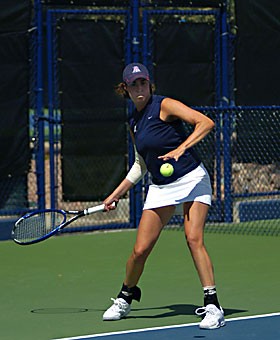A cultural breadbasket provides more than just talent for the Arizona women’s tennis team.
Three international players are preparing for another season in Tucson – a city thousands of miles away from home.
“”They add a lot of flavor to the team in a few different ways,”” said assistant coach Brian Ramirez. “”It’s great for the girls to experience a few different cultures.””
Team captain Danielle Steinberg, a junior from Tel Aviv, Israel, represented the Wildcats as the only invite to the NCAA Singles Championship in May. She was was named first-team All-Academic with a 3.94 grade-point average.
Sophomore Natalia Toporowska, who is originally from Kluczbork, Poland, was ranked the No. 1 tennis player in Ontario, Canada, throughout high school.
Tina Razloznik, a junior from Idrija, Slovenia, went 16-14 in singles matches her freshman year.
“”This allows us a larger pool to choose from to find some very talented young ladies and fill some gaps at the top of the lineup,”” Ramirez said.
Last spring, Arizona graduated two other international players. Kasia Jakowlew of Lund, Sweden, and Jessie Rochefort of Quebec, Canada, made it five international players out of the total nine competitors last year.
Although their tennis talent and academic success is evident, the intangibles and chemistry these players provide go beyond the typical recruit.
“”They bring some different viewpoints,”” Ramirez said. “”It’s really valuable for all the girls to experience things from someone else’s point of view. Everyone’s so different in a lot of ways.””
Steinberg arrived with plenty of traveling experience as an independent tennis player. She welcomed the experience as an exciting endeavor as a freshman captain.
“”Obviously, coming here was a big change for me and a big breakthrough,”” Steinberg said. “”It’s everything I need to succeed.””
Steinberg received a positive vibe from the UA coaching staff and Pacific 10 Conference tennis, which is perennially a top conference in NCAA tennis.
“”I think when you’re international and come to a different country, you’re more mature and you don’t have that continued support from home,”” Steinberg said. “”You have to be more mature and very independent.””
Ramirez believes the team gets a boost from the international flavors because of teammates’ interest in other cultures.
“”The American girls really want to do what they can to help the foreign girls feel more comfortable, part of the team and part of the culture here,”” Ramirez said. “”They lend their hand to help the new girls and incorporate what they do to help the team chemistry.””
Many European universities don’t have tennis teams, and since the professional competition is so intense, a college education with competition on the courts in the U.S. becomes a very enticing offer, Ramirez said.
But despite a high level of international skill on his team, Ramirez said he is beginning to recruit more domestic talent.
“”It’s much easier to watch kids develop over a long period of time if they’re from the U.S.,”” Ramirez said. “”The more we get out and show our face, we can start bringing those American girls more and more to make them part of our team here.””
“”When you find good players and have an opportunity to bring them into your program, it doesn’t matter if they’re inside or outside the U.S.,”” he added. “”You really have to take a very good look at each young lady that shows interest in your program.””









